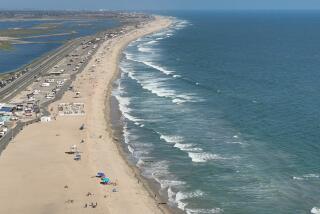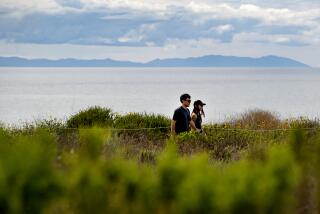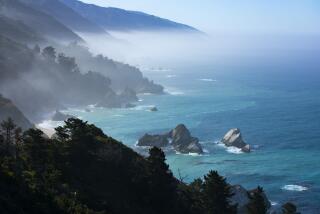Adopt a Beach or Park : Those who enjoy public amenities must do more to maintain them
- Share via
The budget crisis has washed ashore like flotsam at state beaches and parks during this off-peak season. State Parks and Recreation Department officials announced the closure of 15 parks for one or two days a week and are contemplating drastic curtailment in services at others. All of this is necessary because California’s state beaches and parks have fallen $30 million short as a result of lower tax revenues and park fee receipts.
Officials correctly have appealed first to the individual park user as the front line of defense against deteriorating trails, beaches and habitat. At facilities like Crystal Cove State Park in Orange County, mountain bikers would do well to police themselves against wrecking fragile terrain--or risk a ban on backcountry riding. Cleaning up litter is a job for every individual and family at places like Santa Monica State Beach and Point Dume State Beach.
Meanwhile, a state task force has been studying alternative funding sources and considering new ways of getting things done. State parks and beaches certainly are not unique in their need to absorb budgetary hits. But because of their special environmental and recreational appeal, parks and beaches may become the beneficiaries of creative public and private partnerships. The state’s tough standards preclude such revenue devices as the ads that appear on benches in the jurisdiction of the Los Angeles County Department of Beaches and Harbors. But there ought to be ways to facilitate corporate donations of certain park equipment. And private groups that already have demonstrated a sense of trusteeship for the waterfront and the land can be tapped. Organizations such as Surfrider Foundation and the Huntington Beach Wetlands Conservancy may be well positioned to help the state mobilize volunteers to get things done in tight budgetary times.
No doubt the daily scut work of keeping beach and park facilities up and running is less glamorous than responding to a large-scale disaster, like an oil spill, which has a way of pulling people together. But the alternative may be fewer daylight hours of park time, fewer open trails and fewer days at the beach.
Already, programs to adopt beaches and roads have demonstrated convincingly that the public will take custody of the environment. As the parks budget gets tighter, private groups increasingly may have a valuable role to play.
More to Read
Sign up for Essential California
The most important California stories and recommendations in your inbox every morning.
You may occasionally receive promotional content from the Los Angeles Times.













